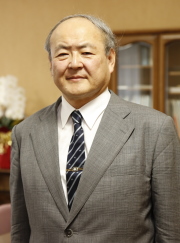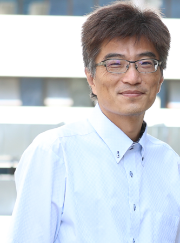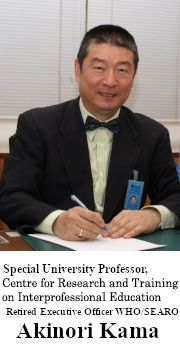Greetings
Greetings from the website of the WHOCC

President of
Gunma University
Yasuki Ishizaki
Modern medicine has become increasingly sophisticated and specialized, and a variety of health care professionals, including physicians and nurses, provide patients with health care. It is therefore necessary for these health care specialists, or professionals working in various medical fields, to communicate with each other, design optimal health care for each patient, and share their roles in an effective manner.
Since its establishment, Gunma University Graduate School of Health Sciences and the School of Health Sciences, has placed special emphasis on interprofessional collaboration among nurses, public health nurses, midwives, clinical laboratory technologists, and physical and occupational therapists. In close collaboration with the School of Medicine, we have implemented curriculums that allow undergraduate students of the Schools of “Health Sciences” and “Medicine” to learn in the same classes to prepare them for interprofessional health care. These efforts implemented by the university, designated as “Simulated Interprofessional Training among Students of Different Professions in Health Sciences and Medicine” (2007 to 2009) and “Interprofessional Education for Comprehensive Undergraduate Training among Students in Health Sciences and Medicine” (2010 to 2012) – “The Support Program for Distinctive University Education (Distinctive Good Practice)” by the Ministry of Education, Culture, Sports, Science, and Technology, have contributed to the promotion of interprofessional education, based on a wealth of experience and achievements.
With the aim of promoting interprofessional health care systems, we have strengthened collaboration with other universities through a variety of activities, such as the organization of the Japan Interprofessional Working and Education Network (JIPWEN). We have also promoted training of health care professionals in Asia, such as the introduction of an educational program for rehabilitation in Mongolia. Over a long period of time, we have contributed to the training of health care specialists and promotion of interprofessional health care at global levels through dispatching personnel to the WHO and working with it.
In this age of the Internet and information-sharing across the world, the WHO Collaborating Centre was established in Gunma University based on a global perspective. The center has facilitated interprofessional collaboration as a future form of health care, and is expected to nurture a number of excellent health care professionals responsible for the future of interprofessional health care.
Greetings from the Head of WHO Collaborating Centre for Research and Training on Interprofessional Education

Head,
Centre for Research and
Training on
Interprofessional Education
Bumsuk LEE
Our centre was designated as a WHO Collaborating Centre in 2013. Since then, in collaboration with many international organizations and educational institutions, including WHO, JICA, and JIPWEN Universities, we have been working on various activities such as holding an IPE Training Course every August, conducting joint researches, and building international networks. We are proud to have contributed to the global dissemination of IPE.
In addition to these activities, between 2025 and 2029 we will also focus on the following activities:
- Establishing key competencies for in-service IPE, and developing and disseminating its educational contents
- Development and dissemination of a health and social care collaboration model based on global common values
- Examining the influence of IPE and CP on psychological safety in health and social care workers
- Supporting the creation and development of the IPE international student organization
The social mission of our centre is to academically examine the influence of IPE and CP on the happiness of individuals, organizations, and societies from the perspectives of both health/social care workers and service users, and to disseminate the findings as common knowledge for all of humanity. We appreciate your continued support and collaboration.
Greetings from the Coordinator Special University Professor

The Gunma University WHO Collaborating Center for Research and Training on Interprofessional Education was designated by World Health Organization since 2013.
Five years ago, I was called to Gunma University after I retired from the World Health Organization (WHO/Regional Office for South-East Asia) after working for more than 25 years to strengthen this WHO collaborating center, and at first I could not fully understand the contents of multidisciplinary education and took the job. However, then I immediately realized the importance of interprofessional education.
Unfortunately, there are only two institutions (two countries) in the world, including Gunma University, as the WHO Cooperation Center, which specializes in this nterprofessional education, which needed to be more active in our university.
In recent years, the Patient Safety Department of the WHO Headquarters has requested strengthening of collaborating center with interprofessional education, which is an activity of this WHO Collaborating Center, and participated in the “World Patient Safety Day”. It has been highly evaluated by WHO Headquarters, WPRO (Regional Office for the Western Pacific), Ministry of Health Labor and Welfare, and related organizations. It was considered a great success.
Since WHO is a specialized agency of the United Nations, people from all over the world with different religions, races, and cultures gather as experts in various occupations. At the SEARO, all staff are divided into two groups, and at a resort in the suburbs where radio waves do not reach for three days, we call it “retreat” and provide interprofessional education so that we can cooperate in better work. The importance of multidisciplinary education will continue to increase, and the WHO Collaborating Center is expected to play an active role.









